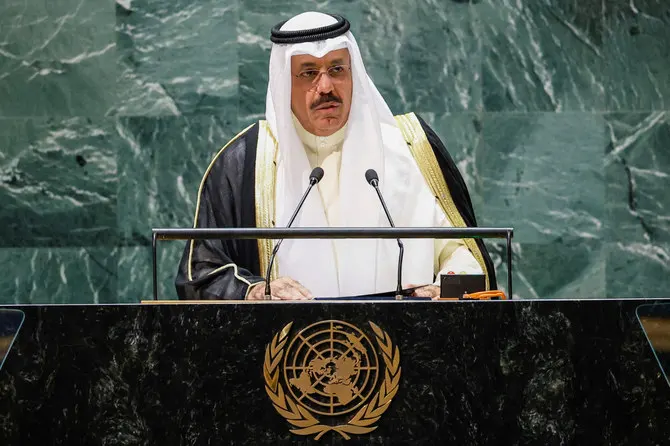Iraq’s failure to adhere to international agreements may lead to chaos and instability, Sheikh Ahmad Nawaf Al-Sabah, prime minister of Kuwait, said Thursday.
Speaking during the 78th UN General Assembly debate in New York, Sheikh Ahmad expressed concern about Kuwait’s relations with Iraq, citing a dispute over their maritime pact ratified by the UN in 2013.
Earlier this month, Iraq’s Federal Supreme Court ruled that the agreement regulating navigation in the Khor Abdullah waterway, which lies between the two nations, was unconstitutional.
“These agreements can help prevent chaos and accidents in the region. They can also protect us from trafficking in arms and narcotics, which are sources of revenue for terrorist and extremist groups,” he said.
land border between the two was demarcated by the United Nations in 1993 after Iraq’s invasion of Kuwait, but it did not cover the length of their maritime boundaries, and this was left for the two oil producers to resolve.
An agreement between the two nations was reached in 2012 and ratified by each of their legislative bodies in 2013.
Sheikh Ahmad called on Iraq to take “immediate, decisive measures” to comply with agreements reached by the two states as well as international resolutions, including Security Council Resolution 833 which demarcated the Iraq-Kuwait border.
“Kuwait reserves the right to undertake the requisite measures, both legal and international measures, to defend its legitimate and legal right pursuant to international resolutions and the norms of international law,” he said.
Sheikh Ahmad also urged the UN to find relief for the Palestinian people who “suffer from Israeli occupation which violates all international norms and conventions.” He called for the establishment of “an independent Palestinian state with east Jerusalem as its capital within the 1967 borders.”
On Sudan and Yemen, he called for the parties involved to end their fighting and seek resolutions through talks.
Sheikh Ahmad urged Iran to refrain what he viewed as interference in the affairs of sovereign nations. He added that the Durra offshore natural gas field, in the neutral zone between Kuwait, Iran and Saudi Arabia, was fully owned by Saudi Arabia and Kuwait.
“These two countries alone have full rights to explore these natural resources,” he said.
On his country’s economy, Sheikh Ahmad expressed his desire to “turn Kuwait into a financial, commercial and cultural hub that can effectively interact with the rest of the region and the rest of the world,” particularly in the fields of climate-friendly measures, renewable energy, and carbon neutrality.
“We welcome the statement by Saudi Arabia regarding the establishment of a global body for water, which would be based in Riyadh … to manage water resources in an effective manner and exploit them in an optimal way,” he said.
Sheikh Ahmad also condemned those burning copies of the holy Qur’an under the pretext of “free speech.”—Agencies










